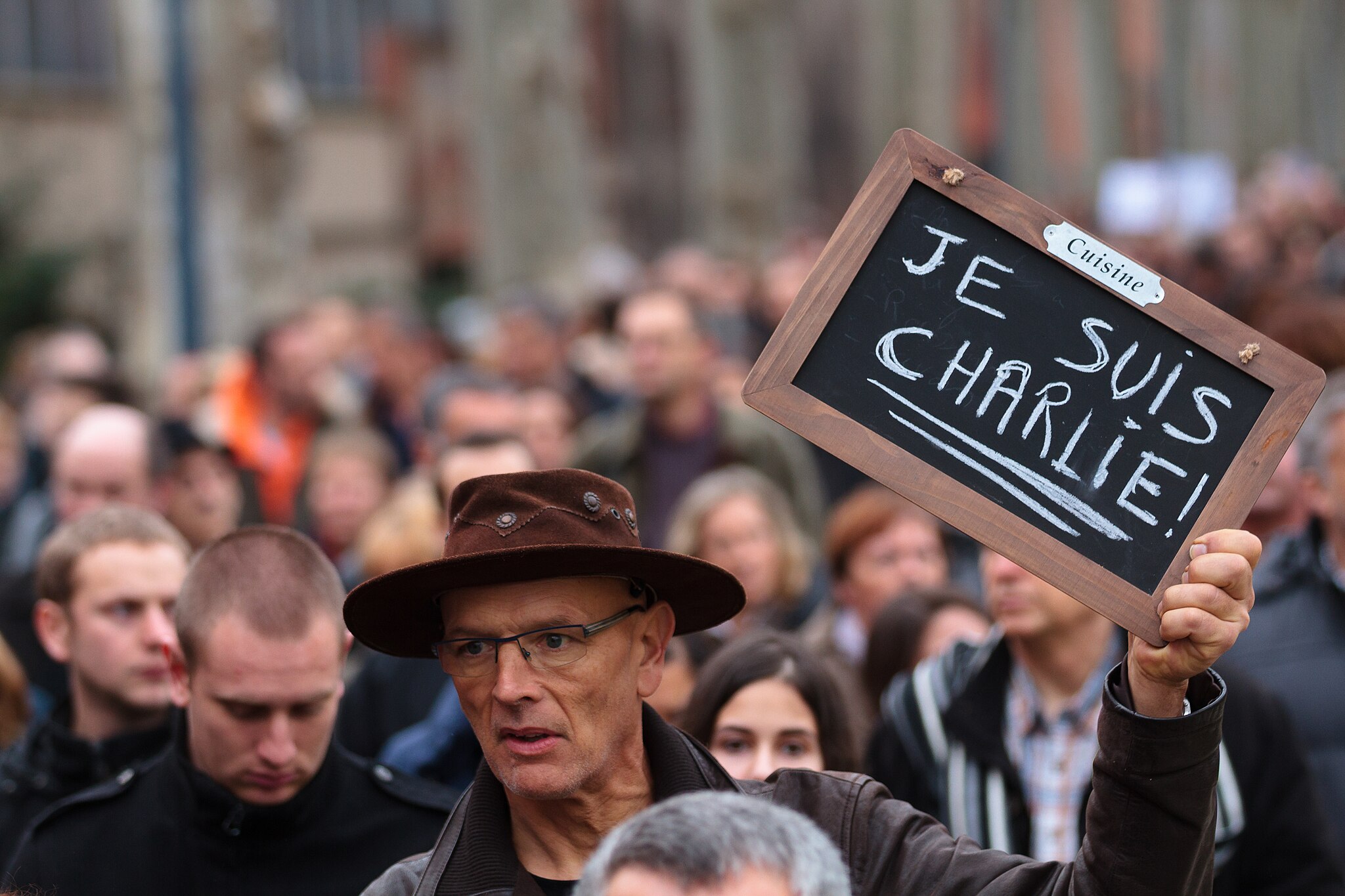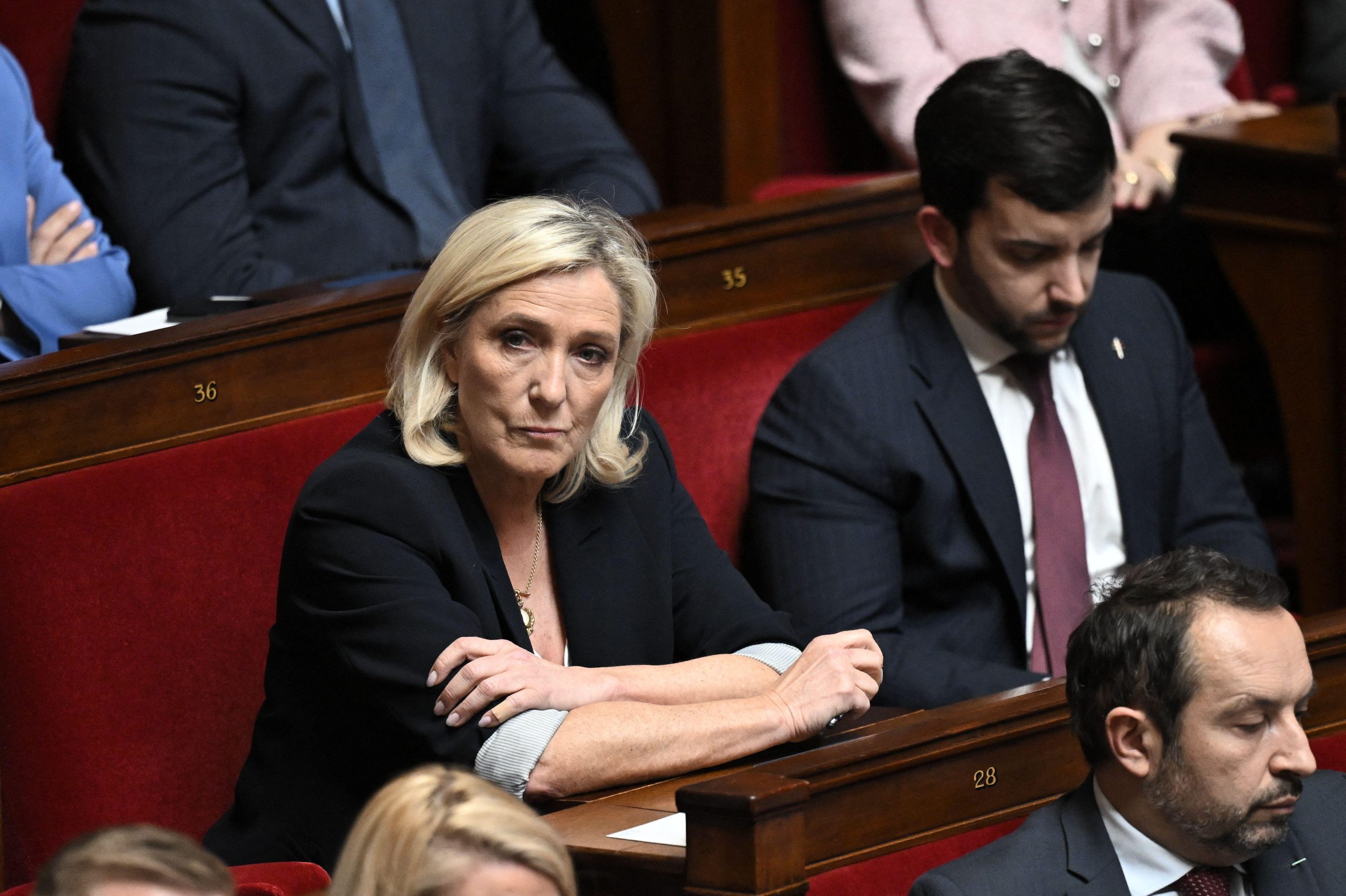This week, 7 January 2025 marks exactly ten years since the Charlie Hebdo attacks, when Islamist gunmen stormed the satirical magazine’s Paris editorial office and killed 11 people over cartoons of the Prophet Muhammed. A month after the attack, the Turkish writer Elif Shafak wrote for us on the increasingly divisive world in which we live, and the urgent need to differentiate between the right to be offended and the right to commit violence. Ten years on, with the proliferation of fractious rhetoric on social media, her words seem more poignant than ever. To mark the anniversary of the tragedy, we have republished Shafak’s piece below. It was originally published online on 12 March 2015, and in print in Volume 44, Issue 1 of Index on Censorship. Charlie Hebdo has also produced a special edition to mark ten years, which you can read more about here.
After the horrific attacks against the French satirical journal Charlie Hebdo and a Jewish supermarket in Paris, the world has turned into a Tower of Babel where there are too many languages spoken but too little, if any, real communication. Ever since those three days of terror in France, across the globe there has been more anger than sorrow, more emotional backlash than rational analysis, and more confusion than insight.
As heartwarming as it was to see millions of Parisians march against religious extremism and countless others show their solidarity via hashtags and messages on social media, we cannot ignore the fact that a rather disturbing cognitive gap is opening up between different parts of the world and different segments of humanity. Even in the face of atrocity, humankind is failing to speak the same language.
Among the political leaders who marched in Paris there were quite a few with a lamentable human rights curriculum vitae. While Saudi Arabia was quick to send a representative to France, the regime did not shy away from publicly lashing Raif Badawi, a liberal blogger, for his views. Israel, Russia and Egypt, among others, have been criticised for their double standards at home and abroad. Turkey, my motherland, has a shocking number of journalists and cartoonists either in prison or facing trial.
No doubt, the most moving response to the act of brutality came from cartoonists across the globe. With powerful images and few words they showed their unflinching support for freedom of expression. But those of us who cannot draw, and therefore must talk or write have done a poor job in general. With every aggrandising remark the cognitive gap widened.
Former French President Nicolas Sarkozy claimed: “This is a war declared on civilization.” Soon after, the Turkish President Recep Tayyip Erdoğan announced: “French citizens carry out such a massacre, and Muslims pay a price.” He then added: “Games are being played with the Islamic world, we need to be aware of this.” Such statements only served to increase conspiracy theories, which abound throughout the Middle East. Meanwhile journalists, academics and writers lampooned each other. The response to a book is another book.
So far, the language over Charlie Hebdo has been more divisive than unifying. Even the usage of conjunctions is a problem. After the tragedy, a top-level politician in Turkey tweeted that it was wrong to kill journalists, but they should not have mocked Islamic values. Never had the word “but” disturbed me so much.
The controversy had important echoes inside Turkey. The secularist newspaper Cumhuriyet wrote a powerful statement, saying that having lost some of their own writers to terrorism in the past, they understood so well the pain of the Charlie Hebdo killings. But the AKP government was of a different mind. The prime minister said printing the cartoons would be considered “heavy sedition” and they would not allow anyone to insult the Prophet. Accordingly, a court order was issued to prohibit access to Turkish websites that insisted in publishing Charlie Hebdo’s recent cover.
In response, independent news website T24 openly defied the court ban and published the entire issue of the magazine. And people kept spreading the cover via their Twitter and Facebook accounts. It was interesting to see how many of these reactions came from people who were already tired of the AKP government’s restrictive attitudes towards freedom of speech. As always, Turkey’s social media operated as a political platform. Over the years as media freedoms shrunk visibly, the social media became more and more politicised.
Every journalist, every poet, every novelist in Turkey knows words carry a heavy weight, and they can get you in trouble. We know that only too well that because of a poem, an article, a novel, or even a tweet we can be sued, put on trial, demonised, even imprisoned. When we write, we write with this knowledge at the back of our minds. As a result there is a lot of silent self-censorship. Yet we find it rather difficult to talk about this subject, mostly because it is embarrassing.
As a Turkish writer both freedom of speech and freedom of imagination are precious to me. When I travel in Muslim-majority countries I often hear people saying “I am offended, don’t I have a right to be?” Yet I believe we are making a grave mistake by focusing on the word “offence”, and questioning whether art can be offensive or people have a right to be offended. We are stuck in a mental trap as long as we cannot manage to discuss violence and offence separately.
We need to divorce the two notions. It is perfectly human to be offended in the face of mockery, opprobrium or slander. That is understandable. Hindus, Jews, Muslims, Christians or agnostics, we can all feel offended by something someone says, writes or does. But that is where the line must be drawn. What is inhuman and unacceptable is to resort to violence and shed blood in response.
The response to a book is another book. The response to an article is writing a counter-article. The response to cartoons is more cartoons, not fewer. Words need to be answered with words. This simple equation is what we have failed to teach to both the younger generations and ourselves.
Let’s be clear: this is not a clash of civilizations. It is not even a battle of religions. Yet it is a clash, and a deepening one, between two mindsets. The real chasm is between those of us who believe in pluralistic democracy, culture of co-existence and the value of diversity and cosmopolitanism, and those who have chosen to divide humanity into mutually exclusive camps: us versus them. It is a cognitive clash therefore.
As Sufis have been saying throughout the centuries, we are all profoundly interconnected. Globalism has way too often been interpreted as an economic and political phenomenon. Yet it also means that our futures, our stories and our destinies are interconnected. The unhappiness of someone living in Pakistan affects the happiness of someone living in Belgium or Australia. We must understand that in this complex web of relations any divisive rhetoric is bound to create more of the same.
Extremism somewhere breeds extremism elsewhere. Islamophobia spawns anti-Westernism and anti-Westernism spawns Islamophobia. A far-right racist in Germany might regard a Taliban man in Pakistan as his arch-enemy but in fact, they are kindred spirits. They share surprisingly similar narrow mindsets. And what’s more, they need each other to exist and to thrive.
We need to get out of the vicious circle of division and hatred before it engulfs us all. Together we must stand and speak up for pluralistic democracy and harmonious coexistence. At the same time, however, now is the time to think about the response we have given to the tragedy calmly and carefully. In this response lie the hidden important clues to our strengths and weaknesses as fellow human beings and the sharpest dilemmas that will continue to beset the world in the 21st century.





